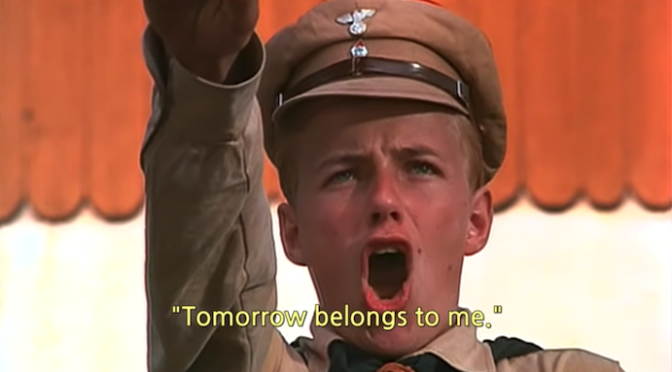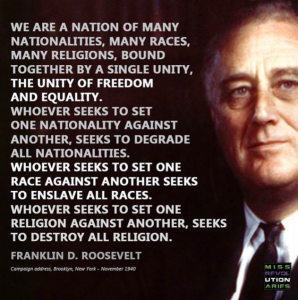Many who could gather together enough money to leave came to America, resulting in nearly a million poor Irish immigrants arriving on American shores during the famine years alone. These huge masses of desperate, often uneducated Irish made up the first large migration of poverty-stricken people to the U.S. This caused an upswelling of nativist hatred, bigotry and violence toward the Irish that took decades to abate.
Tag Archives: Xenophobia
How Xenophobia Destroys Us from the Inside
A model member of the Massachusetts Institute of Technology community, a hardworking go-getter who regularly works 16-hour days to support his family (which includes two daughters—both U.S. citizens—and a wife who is eight months into a high-risk pregnancy), is likely to be deported this summer. Does he have a criminal record? No. Is he a leech on the public welfare system? No. Francisco Rodriguez not only works full time as a custodian at MIT but also runs a carpet-cleaning company, and he pays income taxes on both jobs.
Did he lie to the government and try to sneak in? No; he applied for asylum when he moved here from El Salvador just over a decade ago. A mechanical engineer in his native country, his success made him a target of gangsters who shook him down and threatened him with murder if he didn’t pay them even more. He has been up-front with the Department of Homeland Security all along the way. The U.S. would not give him asylum, but until recently they would not begin deportation proceedings, either, since it was clear that Francisco was not a risk to our nation—indeed, he was a taxpayer and a job-creator, he supported his family and was active in his children’s school, his church and his union. But on July 13, he will meet with representatives of ICE, possibly for the last time before he is forced to leave his family, his job, his business—everything—behind in the U.S., the country he has served so well for over a decade.
So what changed? Our nation is now led by a man who sees all born outside of our borders as lesser beings, and he sees those who were born in countries below our southern border as especially dangerous and worthless, with inherent violent and immoral tendencies, no matter how clearly the facts prove otherwise.
Francisco Rodriguez wasn’t targeted for deportation because he’s a danger to society; he was chosen because his honesty made him easy to find, and his lack of criminality made him highly unlikely to cause a fuss when he was singled out for removal from his home, his family, his job and his community. If Francisco is deported, he and his wife will not be allowed to travel between the U.S. and El Salvador to visit each other for at least ten years.
The true cost of Trump’s anti-immigrant, anti-refugee policy is this: families are torn apart; honest and hardworking people are forced to give up everything to go to countries where their safety is at risk; taxpayers are taken off the rolls, so the IRS loses out on revenue; and formerly independent families are forced to ask for assistance during and after family crises (in this case a high-risk birth with no father present—a crisis completely manufactured by the U.S. government).
The knock-on effect of sweeping deportations to families, businesses, tax rolls and our culture in general is enormous and devastating. It will soon be felt strongly in the business world and will result in lower income tax revenues as well. The service and construction sectors rely heavily on undocumented labor and are fearful of the increasing costs of hiring citizens who want greater income and shorter hours. The agriculture sector is already feeling the pinch and is worried about how they’ll manage to find enough farm workers to bring in their crops. They can’t find enough citizens willing to work long hours in seasonal agricultural jobs in the blistering harvest-season heat, even as wages rise. Produce will rot before it can be picked and distributed when there are not enough workers to go around. Will our supposedly business-savvy president recognize the folly of his fear and hate then? It is doubtful.
These misguided policies fuel our growing xenophobia and will take a huge economic and emotional toll on our nation. It is never in our country’s interests to treat good, honest, hardworking people like criminals because of an accident of birth. Our moralistic pronouncements about the greatness of our country are hollow when we use our might to destroy lives, to vilify honorable people and to dismantle our social compact out of unearned self-regard based on birth and not innate worth. We harm ourselves as well as others when we let our fears and prejudices overcome reason, mercy and human decency.
Tomorrow Belongs to Me
Here is a chilling scene from the musical film Cabaret by composers John Kander and Fred Ebb. In this first week of the Trump presidency, when our freedoms are already being ripped from us and a dark, xenophobic hatred is settling on our nation, sharing this troubling work of art feels particularly and horribly apt and important.
Kander and Ebb wrote a number of musicals, including Chicago, together. Their biggest hits were stories of darkness and decadence in which the music, though catchy and clever, eloquently underscored the sordid qualities of the worlds in which their stories took place. Their songs (including “Cabaret,” “New York, New York,” “Maybe This Time” and “All That Jazz“) are so pleasing that they can be pulled from their context and enjoyed as great tunes whenever and wherever you like. But in context, Kander and Ebb’s songs enrich and amplify the plays’ messages and power and make them two of the most important creators in the musical theater canon.
As gay Jews born in the 1920s, both Kander and Ebb had seen and experienced antisemitic and homophobic bigotry personally. One imagines that those difficult experiences can only have deepened their understanding of and sympathy for the characters for whom they wrote.
Please watch this clip to the end to experience its full, chilling power. Far from being a simple musical comedy, Cabaret is the story of life around a Berlin cabaret during the rise of the Nazi party during the early 1930s. It shows how evil infiltrates a cultured and cosmopolitan nation, and how no amount of retreating to the cabaret for distractions can keep the evil truths of the outside world from overtaking a once-beautiful culture.
Nothing to Fear But Fear Itself
President Franklin Delano Roosevelt made the following statement during a campaign speech in November 1940, just over a year before the U.S. entered World War II:
“We are a nation of many nationalities, many races, many religions—bound together by a single unity, the unity of freedom and equality. Whoever seeks to set one nationality against another, seeks to degrade all nationalities. Whoever seeks to set one race against another seeks to enslave all races. Whoever seeks to set one religion against another, seeks to destroy all religion. “
This is a noble statement, but the president himself made the grave error of rounding up all people of Japanese descent and imprisoning them in internment camps during World War II on the baseless assumption that they would be less patriotic, loyal or law-abiding than people of other ancestries. He was wrong. Not one single Japanese-American was determined to have committed a treasonous act anywhere in the United States before, during or after World War II. Not one.
Indeed, many of those same Japanese-Americans fought nobly for the U.S. and Allied Forces during World War II, even as their families were imprisoned at home. FDR’s words quoted here are right and beautiful, but even he was blinded by fear. He had said at the outset of his presidency that the only thing we had to fear was fear itself, and fear is certainly the source of hatred for people and ideas other than our own. Fear makes us turn inward, and that allows us to remain ignorant, to refuse to empathize, ask questions or try to figure out how it feels to be one of those people who frighten us.
Fear keeps us from facing the humanity of our enemies, and makes us see enemies among our friends. It makes American governors look at orphaned Syrian toddlers and see danger; it makes Trump rally audiences look at a single African-American man who asks to be treated as if black lives matter, and then beat him to a pulp because he peacefully but loudly speaks up about bigotry in public. It is only by seeing others as human first that we can figure out how to talk to and deal with them honestly, honorably and peacefully.
[Image source: missrevolutionaries.com]



